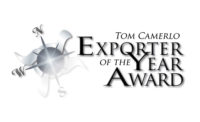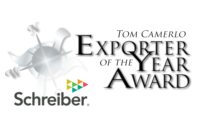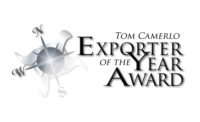Milk Specialties Global named 2018 Exporter of the Year
With a vision focusing on what’s next, fast-growing Milk Specialties Global works with its international customers to grow their businesses with innovative uses of high-protein dairy.








Milk Specialties Global (MSG) does more than sell dairy ingredients to customers in 40 countries. With a vision focusing on what’s next, the fast-growing company works with its international customers to grow their businesses with innovative uses of high-protein dairy.
This proactive, customer-centric approach has helped make MSG the 2018 Tom Camerlo Exporter of the Year. Sponsored by the U.S. Dairy Export Council (USDEC) and presented by Dairy Foods magazine, the award is given annually to a U.S. dairy supplier that:
- Exemplifies leadership in advancing U.S. dairy exports.
- Demonstrates a commitment to export market development.
- Makes exports an integral part of its overall growth strategy.
MSG CEO David Lenzmeier accepted the award on Oct. 16, 2018, at the USDEC Board of Directors and Annual Membership Meeting in Chicago.
“This award is the culmination of a long-term strategy,” Lenzmeier said in an interview. “It didn’t happen overnight. It all starts with people and continues with an ongoing high level of engagement. That’s what I’m happiest about. You can’t win this award without an entire team effort.”
With headquarters in Eden Prairie, Minn., just outside Minneapolis, MSG grew from 550 to 850 employees over the last four years as it expanded to meet the surging global demand for protein ingredients.
MSG is the largest supplier of whey protein isolate in the world. With an increasing focus on overseas opportunities, it exports more than 70% of its carbohydrates volume (whey, permeate and lactose) and almost 20% of its high-protein volume.
Reasons to be honored
MSG is being honored with the 2018 Tom Camerlo Exporter of the Year Award for a number of reasons:
- MSG prides itself on a stated purpose of “providing nutritional solutions to the world.”
- Overseas staff frequently participate in export activities, not only promoting their products, but also doing the same for U.S. dairy ingredients.
- MSG has exhibited at Food Ingredients Asia, IFT18, Gulfood and other trade shows that put the company in touch with international customers.
- The company participates in USDEC activities, including a “Milk Protein Mission” several years ago to China and Japan, where the company introduced MSG products and promoted the U.S. dairy industry as a whole.
- The company exports to markets and regions that boast growing functional food and sports nutrition sectors, including Latin America, China, Southeast Asia, Mexico and Canada.
- MSG’s export markets are experiencing strong economic growth, which is fueling middle-class expansion and dietary shifts that trend toward healthier lifestyles.
One company, two divisions
The company has 10 manufacturing facilities spread across five states, serving two company divisions:
- Animal Nutrition began in 1949 and has long been recognized for innovative and science-based products that offer proven benefits to animals. MSG has a broad portfolio of products for animal nutrition with leadership positions in protein encapsulated fats and private label milk replacers.
- Human Nutrition launched in 2008 with the arrival of Lenzmeier as CEO. This division has seen fast growth recently as on-the-go consumers increasingly look for high-protein foods and beverages. MSG continues to expand, growing both domestic and international sales.
The quest for what’s next
MSG currently has nine sales representatives focused on human nutrition geographically located around the world. They’re supported by a team of experts in production, quality, supply chain and other functional areas — all working to provide high-quality dairy ingredients to meet customers’ requirements.
The global solutions-based philosophy can’t be missed in the company’s purpose and vision statements.
- MSG’s purpose: “To provide nutritional solutions to the world.”
- MSG’s vision: “Milk Specialties Global is what’s next in speed, execution & passion in our relentless pursuit to lead in our market categories.”
“We get in front of the customer,” said Shane Reynolds, MSG’s director of risk management. “We understand their pain points and collaborate to find solutions.”
Opportunity and innovation
In the United States, consumers are increasingly looking for convenient on-the-go high protein products. The same is true globally. MSG has the ingredients that companies need to meet that demand.
For example, in Asia, keto-friendly bars have soared in popularity. These bars are low in carbohydrates and high in fat, and they provide protein for people on a ketogenic diet.
Working with a customer in Asia, Director of Business Development Jing Hagert tapped into her knowledge of the region and her understanding of what MSG can deliver to point out both a problem and an opportunity the customer didn’t see: Most keto-friendly bars taste powdery.
Hagert showed the customer how MSG could help it stand out by creating a product with a more pleasing taste and texture. Over a several-month period, MSG and the customer worked together on a formula, with plenty of back-and-forth, trial-and-error and communication between China and MSG’s R&D team in Minnesota.
They developed a keto-friendly bar with multiple improvements: It is less powdery, chewier and more appropriately sized. It comes in two flavors: cheese with sea salt and coffee.
To develop an improved product, the companies moved beyond the traditional roles of supplier and buyer to become transpacific innovation partners.
The improved product is in consumer testing and the results appear promising, said Hagert, whose fluency in Mandarin and English helps the companies understand each other. Hagert said the most common consumer reaction the company heard could be translated roughly as, “Hey, this is really good!”
It remains to be seen whether this new keto-friendly bar will be a hot seller. But the ideation, innovation and collaboration that led to the new product’s development illustrate the MSG approach. Provide solutions, and the sales of ingredients will follow.
Opportunities in Europe
MSG has identified Europe as a “what’s next” market for high-protein dairy ingredients growth. The opportunity for business development in Europe is clear.
The European nutrition market is roughly one-third the size of the United States’ — even though the continent has double the population.
“That tells you straight away that this is a high-potential market that has a lot of growth to go,” said Michael Hiron, vice president of human nutrition and ingredient sales. “We want to be in the forefront, offering this market what it needs and promoting U.S. dairy.”
Global and mobile protein
Hiron sees a world where “everyone is on the run,” himself included. He drinks three protein shakes every day, and the company’s breakroom makes it easy by providing a blender with all the high-protein fixings.
When he is in an airport, which is frequently, Hiron tries to find a place to buy a protein shake to keep his energy level up.
“I enjoy the flavor and texture of protein shakes,” Hiron said. “I like milk. It’s not only full of protein and carbohydrates, but it also has minerals and healthy fats. I have been drinking milk since I was a child.”
Looking ahead, MSG thinks the world will be eating more of what it sells in all sorts of products not previously imagined.
The first fizzy high-protein water
One such product is fizzique, the world’s first sparkling protein water. MSG worked closely with NEXT Proteins Inc. over a two-year period to create a fizzy, high-protein, clean-tasting beverage that would remain stable for several months.
As reported in Nutrition Insight, attendees at Natural Products Expo West, held in March, sampled the beverage in the flavors tropical limon and strawberry watermelon. Both formulas contain 20 grams of whey protein isolate. Sweetened with sucralose, the beverages have only 80 calories per can and zero carbs.
It can be purchased on Amazon, where it was getting 4.7 out of 5 stars at press time. One reviewer summed up the appeal, saying, “What I like about the product is it is light, carbonated and refreshing, not heavy like other protein drinks. I can drink fizzique any time or place, not just for workouts.”
Global game-changer
Hiron predicts fizzique will be a global “game-changer.”
That is what MSG has been doing for years — changing the dairy ingredients export game by understanding its customers with a constant eye on what’s next.
Studies show consumers around the world increasingly want high-protein, clean-label products that are convenient on the go and taste consistently good. MSG has demonstrated it is a consistent supplier of high-quality dairy ingredients global customers trust to meet that worldwide need for more protein.
Looking for a reprint of this article?
From high-res PDFs to custom plaques, order your copy today!









